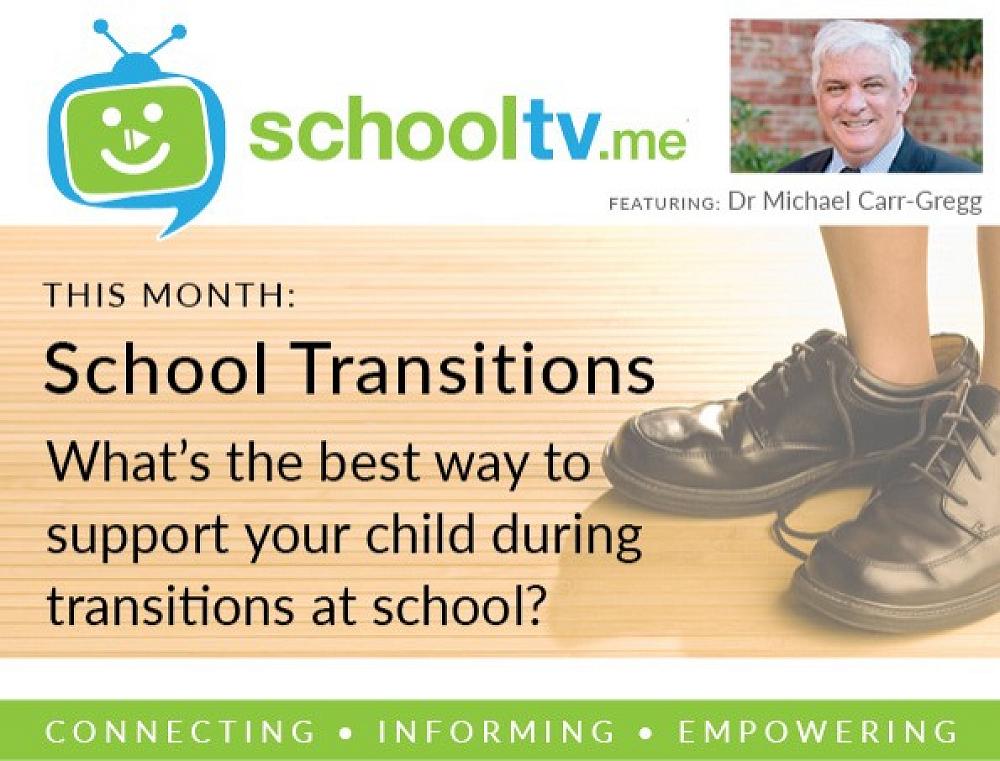
School TV: School Transitions
Transitions are a normal and regular part of life. As a parent it is important to support your child with changes so that they develop the understanding that change is normal, and that they have the ability to cope with transitioning.
Transitions occur in a variety of ways at school, whether students are starting school, starting at a new school, beginning high school or beginning the year with a new teacher. Yet, transitions can happen any day of the year as well, such as friendships changing, the change of term or seasons, transitioning into a new class seating plan or joining a sports or cultural group.
In addition to the headmaster, Dave Scott’s, first newsletter of the year which included a range of important ways to support your child as they transition into the new school year, School TV provides a range of excellent resources to support your child with transitioning at school. This newsletter will summarise some of the key points from School TV, relating to School Transition, and then briefly talk about School TV and the resources available on its website.
Key points regarding school transitions:
Parents need to act as their child’s prefrontal cortex by:
Managing your own anxieties and remaining calm in front of your child
Being positive and proactive about school
Listening to and acknowledging your child’s experiences without over-analysing things
Supporting organisation and planning, such as visiting a new school or getting school gear ready together
Connections are important
Create a connection with your child’s teacher so that when you need to share significant information, such as changes at home that may impact your child, you are able to do so easily
Schools can act when they receive information so feedback is important
A key indicator of success for your child is their own social connections, so support these, for example by helping to organise playdates
Normalise change
Explain that transitioning is a normal and expected part of life
Talk about change as simply another experience in your child’s life, one for which they can plan and prepare with your support
Be patient and calm
Settling into new environments and routines can take time - be calm, logical and patient
It is not realistic to expect everything to be amazing all of the time - okay is okay!
Transitioning is tiring! Create meaningful family and relaxation time at home so that your child can rest and feel connected with you
Finally, remember that your child is unique, and school is not the same as it was when you were their age, so accept that their experience may not be the same as yours!
School TV website: School Transitions
The Primary Teaching Panel videos are specific to primary school and helpful for parents of students new to school
The Secondary Teaching Panel and Michael Carr Gregg videos are most helpful for parents of Year 8 students who will be going to high school next year
There are a range of great resources in general, and not just great tips for transitioning but for several areas relating to school life. I would encourage you to read the headings of all of the videos and watch those that are relevant to you and your child, with some examples including balancing activities and rest time, managing peer pressure, mobile phone usage and developing fine motor skills
Note that Year 7 is the first year of high school in Australia, so think Year 9 for New Zealand
Some references or organisations are specific to Australia, and some websites may only be accessible in Australia, so please contact me if you are unsure of the New Zealand equivalent
Image sourced from: School TV
Jenelle Hooson
Jenelle is a fully registered member with NZAC (New Zealand Association of Counsellors).
If you wish to discuss the services the School Counsellor can provide, please talk to your child’s homeroom teacher or make contact with Jenelle directly: jenelle.hooson@medbury.school.nz